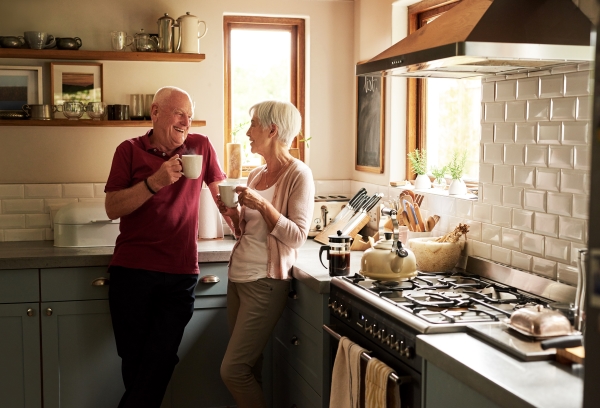
During the COVID-19 pandemic, seniors have shifted towards using more tech service solutions to accomplish their everyday tasks. Parks Associates found that during the pandemic, 29% of U.S. seniors ages 65 and older used video conferencing services and 27% used telehealth/remote consultation services. As they build comfort with using tech, seniors can easily transfer these new skills to utilize alternative tech solutions to manage their health. Tools like PERS units, personal check-in calls, and smart devices continue to progress and can change seniors’ relationships with home healthcare.
Smart Speakers and PERS Units
The PERS (Personal Emergency Response System) is the classic solution for extending aging in place for seniors, but newer technology like smart speakers could expand the features of PERS systems. Allowing seniors to call for help via voice and eliminating the need to wear a pendant or wristband, providing multi-room or multi-floor solutions that expand coverage beyond the bedroom or main living area, and allowing drop-in communication via smart speakers are just a few ways I could see these devices progressing in years to come.
Check-In Calls
One of the most devastating effects of the COVID-19 quarantine has been the inability for many seniors to see their friends and family in person. Seniors are some of the most affected people in this scenario due to their health vulnerability, leaving many of them suffering from extreme loneliness. To help combat this issue during the pandemic and beyond, ADT has begun offering a Check-In Call service to seniors. During Check-In Calls, ADT Health agents converse with enrolled seniors on topics ranging from their favorite activities to their family and personal life. In the future, these calls could also be used to help seniors schedule rides to doctor appointments or grocery delivery.
Using Smart Devices to Recognize Patterns
Smart home devices can be used to recognize our health and behavioral patterns. When there is a noticeable change in our daily patterns, whether that be staying in bed longer or using the bathroom more frequently, it can sometimes signify that a health issue is arising. Using smart devices like motion detectors to recognize these events could help predict health issues sooner and potentially provide perks like insurance discounts.
As seniors get more acquainted with using technology, and as technology addresses evolving needs in senior healthcare, they can realize the benefits it brings like staying in their homes longer and the maximized convenience of remote care. I see a future where our homes can help take care of us, and the progress of technology is getting us closer and closer to that future.